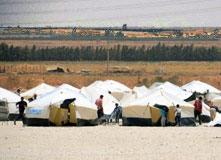 To support national health authorities in countries hosting displaced populations, WHO works with UNHCR, the United Nations Relief and Works Agency (UNRWA) and other partners to ensure the provision of health services to refugees and host communities. Photo credit: Heba Aly/IRIN.2 July 2013 – More than 55% of the world’s refugee population come from five countries in states of emergency in the WHO Eastern Mediterranean Region, according to a new report by the United Nations refugee agency UNHCR on global refugee trends in 2012.
To support national health authorities in countries hosting displaced populations, WHO works with UNHCR, the United Nations Relief and Works Agency (UNRWA) and other partners to ensure the provision of health services to refugees and host communities. Photo credit: Heba Aly/IRIN.2 July 2013 – More than 55% of the world’s refugee population come from five countries in states of emergency in the WHO Eastern Mediterranean Region, according to a new report by the United Nations refugee agency UNHCR on global refugee trends in 2012.
Out of the 7.6 million people who became refugees in 2012, more than 4 million originated from Afghanistan, Iraq, Somalia, Sudan and the Syrian Arab Republic. This is the highest number of refugees since 1994, with the conflict in the Syrian Arab Republic being a major factor.
Internal conflict forced 2.58 million Afghans to flee in 2012, mainly to Pakistan and the Islamic Republic of Iran. In Somalia, almost 8% of the population (1.13 million Somalis) became refugees, joined by 569 200 Sudanese and 746 400 Iraqis. Escalating conflict and violence in the Syrian Arab Republic forced 728 500 people to flee the country by the end of 2012, although this number has now more than doubled as of June 2013.
Displaced populations fleeing conflict usually require emergency and trauma health care, while others with chronic illnesses, such as cardiovascular diseases, diabetes and cancer require longer term and more expensive treatment. As a result, refugees place an additional strain on the health systems of host countries, both in terms of finances and resources. In the Syrian Arab Republic, for example, refugees in Lebanon and Jordan have overstretched national health systems to capacity, resulting in a call by host governments for urgent international support.
Low immunization coverage in the country of origin, coupled with population movement and overcrowded living conditions among refugees increase the risk of disease outbreaks. In Somalia, immunization coverage rates below 60% increase the risk of unvaccinated children contracting and transmitting communicable diseases as their families flee to neighbouring countries. Similarly, low immunization rates in the Syrian Arab Republic have resulted in increased cases of measles and other communicable diseases among Syrian refugees in Egypt, Iraq, Jordan and Lebanon. Jordan, which had reported zero cases of measles for three years and was planning to officially declare a measles-free status, recently launched an emergency vaccination campaign after cases of measles were confirmed in Al-Zaatari refugee camp.
WHO and partners support response to public health threats from infectious diseases by supplying safe drinking-water and sanitation, strengthening disease early warning systems, prepositioning emergency and trauma kits, medicines and medical supplies, and participating in emergency mass vaccination campaigns.
Related links
UNHCR’s report “Global Trends 2012” and additional statistical information on global displacement
Call by host governments for urgent international support
WHO warns of increased risk of disease epidemics in Syria and in neighbouring countries


